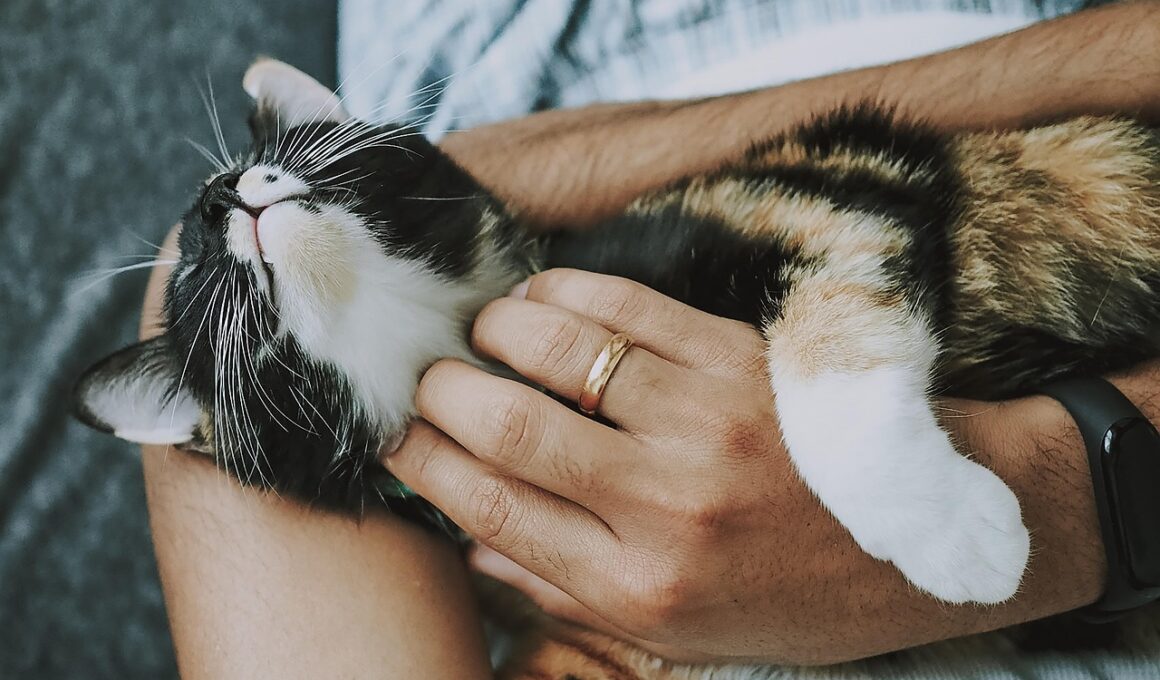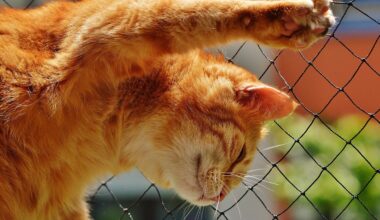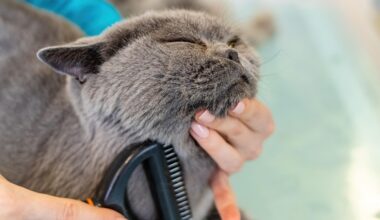Monitoring and Managing Chronic Conditions in Elderly Rescued Cats
Chronic conditions in elderly rescued cats pose significant challenges. These conditions, often requiring ongoing treatment and special care, can affect the cat’s quality of life. Veterinary care plays a vital role in monitoring these chronic issues, including diabetes, kidney disease, and arthritis. Regular veterinary visits ensure that these conditions are managed effectively and any changes in the cat’s health are closely monitored. It is essential for caregivers to understand the symptoms associated with chronic conditions. Weight changes, alterations in appetite, and shifts in behavior may indicate a deterioration in health. Proper management involves a comprehensive care plan tailored to the individual cat’s needs. This may include medication, dietary adjustments, and modifications to their living environment. Collaboration with veterinary professionals can help develop an effective management strategy. Additionally, keeping an open line of communication with the veterinarian is crucial. Caregivers should provide detailed observations of the cat’s behavior and health to inform treatment decisions. Understanding the intricacies associated with chronic conditions aids in providing optimal care for elderly rescued cats.
In many cases, dietary adjustments are fundamental in managing chronic conditions effectively. For cats with diabetes, strict adherence to a specific dietary regimen is vital to regulate blood sugar levels. Specialized diets can help manage weight and prevent additional health complications. For kidney disease, high-quality proteins and low phosphorus are essential. A veterinarian can recommend an appropriate diet that meets the cat’s unique requirements. Hydration is equally important; encouraging fluid intake can help maintain kidney health and prevent dehydration. For aging cats, nutritional supplements may also play a crucial role. These can support joint health, enhance immune function, and improve overall vitality. It’s essential to select supplements that have been approved by veterinarians. Moreover, monitoring food and water consumption can provide valuable insights into the cat’s health status. Keeping a daily log will help in recognizing any trends or changes in appetite or water intake. Regular weigh-ins can also assist in tracking weight management and assessing dietary effectiveness. Ensuring elderly rescued cats maintain a healthy weight helps to mitigate the risks associated with various chronic conditions.
Regular Veterinary Check-Ups
Routine veterinary check-ups are critical for elderly cats diagnosed with chronic conditions. Regular examinations allow veterinarians to assess the cat’s overall health, adjust treatment plans, and address emerging issues promptly. Many chronic conditions can lead to secondary health problems if left untreated. For instance, untreated arthritis may lead to reduced mobility and a reluctance to engage in normal activities. Moreover, during these check-ups, veterinarians can perform necessary tests, such as bloodwork or urinalysis, to monitor specific health parameters. Early detection of any changes can significantly affect treatment efficacy. Discussing any behavioral changes observed at home with the veterinarian can provide context for any subtle shifts in health. Establishing a tailored schedule for check-ups based on the cat’s individual health needs is recommended. This can range from every three months to every six months, depending on their health status. Many veterinary clinics also offer senior wellness plans, which can help reduce the costs associated with frequent visits. These plans often include essential services, ensuring that elderly cats receive comprehensive care at an affordable price.
When it comes to administering medications, proper technique is essential for effectiveness. Cats can be notoriously difficult to medicate; therefore, creating a calm environment is vital. Using pill pockets or disguising medications in food can help. However, for medications that must not be mixed with food, the caregiver may need to administer them directly. Consulting with the veterinarian on the best administration methods helps ensure adherence to the treatment plan. Additionally, some medications may cause side effects that need monitoring. Notifying the veterinarian of any adverse reactions enables timely adjustments to the treatment regimen. Moreover, behavioral changes following medication adjustments can indicate a need for further intervention. Caregivers should keep detailed records of any side effects observed, including when they occur and their severity. This information will be pivotal during routine veterinary check-ups. Another essential aspect of managing chronic conditions involves environmental modifications. Providing a comfortable living space with easy access to food, water, and litter boxes makes daily life manageable for elderly rescued cats, while also reducing stress.
The Importance of Stress Management
Stress can exacerbate many chronic conditions in elderly rescued cats, making stress management integral to their care. Cats thrive in environments where they feel secure and safe. Changes in routine or environment can trigger stress and lead to health deterioration. Therefore, maintaining consistency in daily activities is essential. Creating safe spaces within the home, such as quiet corners with comfortable bedding, can help cats retreat when they feel anxious. Additionally, providing vertical spaces or cat trees allows them to exercise and feel secure while observing their surroundings. Interactive play can alleviate boredom, reduce stress levels, and improve mental health. Engaging with the cat using toys that stimulate their hunting instincts fosters a positive emotional state. It’s also vital to monitor interactions with other pets or people in the household; sometimes, minimizing these interactions is necessary for their well-being. Regularly checking on the cat’s emotional health can prevent stress-related health issues. Collaborating with a veterinarian or animal behaviorist to address any behavioral concerns can greatly enhance the quality of life for elderly rescued cats.
In addition to physical and emotional well-being, enriching activities contribute significantly to an elderly cat’s quality of life. Enrichment can take many forms, from puzzle feeders designed to stimulate cognition to interactive toys that promote physical activity. These activities help to engage a cat’s senses, keeping them mentally sharp and physically fit. Regular enrichment prevents boredom and the development of lethargy, often seen in cats with chronic health issues. Scheduled playtime fosters bonding between the caregiver and the cat, enhancing their relationship. Nature viewing through window perches can also stimulate mental engagement. Furthermore, rotating toys keeps the environment interesting for the cat, preventing desensitization to their surroundings. Even simple activities, like singing or talking to the cat, can encourage interaction and socialization. Adapting enrichment activities based on the cat’s physical capability is key. Elderly cats may have limitations, making gentle activities more suitable and beneficial. Therefore, caregivers need to observe their cat’s reactions to various forms of enrichment to customize their environments. This individualized approach will enhance their experience and further support their health.
Conclusion
In conclusion, managing chronic conditions in elderly rescued cats is a multifaceted endeavor that requires dedication and knowledge. It is crucial for caregivers to be proactive and informed about their cats’ specific needs, including dietary requirements, medication, and overall health assessments. Regular veterinary check-ups and effective stress management are essential components in creating a successful care plan. Enrichment activities play a vital role in maintaining physical and emotional well-being, ensuring that elderly cats can enjoy a higher quality of life. Caregivers should also maintain accurate records of medications, appointments, and health observations to facilitate better communication with veterinarians. Collaboration between caregivers and veterinary professionals leads to the optimal management of chronic conditions. With the right approach, elderly rescued cats can thrive instead of just survive, enjoying their golden years with comfort and care. This commitment not only enhances their health but also deepens the bond between the cat and caregiver, promoting a fulfilling companionship. Ultimately, every effort in managing chronic conditions contributes to a brighter future for these deserving feline friends.


